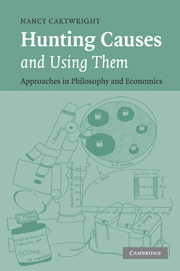Book contents
- Frontmatter
- Contents
- Acknowledgements
- Introduction
- Part I Plurality in causality
- Part II Case studies: Bayes nets and invariance theories
- 5 Preamble
- 6 What is wrong with Bayes nets?
- 7 Modularity: it can – and generally does – fail
- 8 Against modularity, the causal Markov condition and any link between the two: comments on Hausman and Woodward
- 9 From metaphysics to method: comments on manipulability and the causal Markov condition
- 10 Two theorems on invariance and causality
- Part III Causal theories in economics
- Bibliography
- Index
10 - Two theorems on invariance and causality
Published online by Cambridge University Press: 03 December 2009
- Frontmatter
- Contents
- Acknowledgements
- Introduction
- Part I Plurality in causality
- Part II Case studies: Bayes nets and invariance theories
- 5 Preamble
- 6 What is wrong with Bayes nets?
- 7 Modularity: it can – and generally does – fail
- 8 Against modularity, the causal Markov condition and any link between the two: comments on Hausman and Woodward
- 9 From metaphysics to method: comments on manipulability and the causal Markov condition
- 10 Two theorems on invariance and causality
- Part III Causal theories in economics
- Bibliography
- Index
Summary
Introduction
The project
Much recent work on causal inference takes invariance under intervention as a mark of correctness in a causal law-claim. Often this thesis is simply assumed; when it is argued for, generally the arguments are of a broad philosophical nature with heavy reliance on examples. Also, the notions involved are often characterized only loosely, or very specific formulations are assumed for the purposes of a particular investigation without attention to a more general definition, or different senses are mixed together as if it did not matter. But it does matter because a number of different senses appear in the literature for each of the concepts involved, and the thesis is false if the concepts are lined up in the wrong way.
To get clear about whether invariance under intervention is or is not necessary or sufficient for a causal-law claim to be correct, and under what conditions, we need to know what counts as an intervention, what invariance is, and what it is for a causal-law claim to be correct. Next we should like some arguments that establish clear results one way or the other. In this chapter I offer explicit definitions for two different versions of each of the three central notions: intervention, invariance and causal claim. All of these different senses are common in the literature. Then, given some natural and relatively uncontroversial assumptions, I prove two distinct sets of theorems showing that invariance is a mark of causality when the concepts are appropriately interpreted.
- Type
- Chapter
- Information
- Hunting Causes and Using ThemApproaches in Philosophy and Economics, pp. 152 - 172Publisher: Cambridge University PressPrint publication year: 2007

